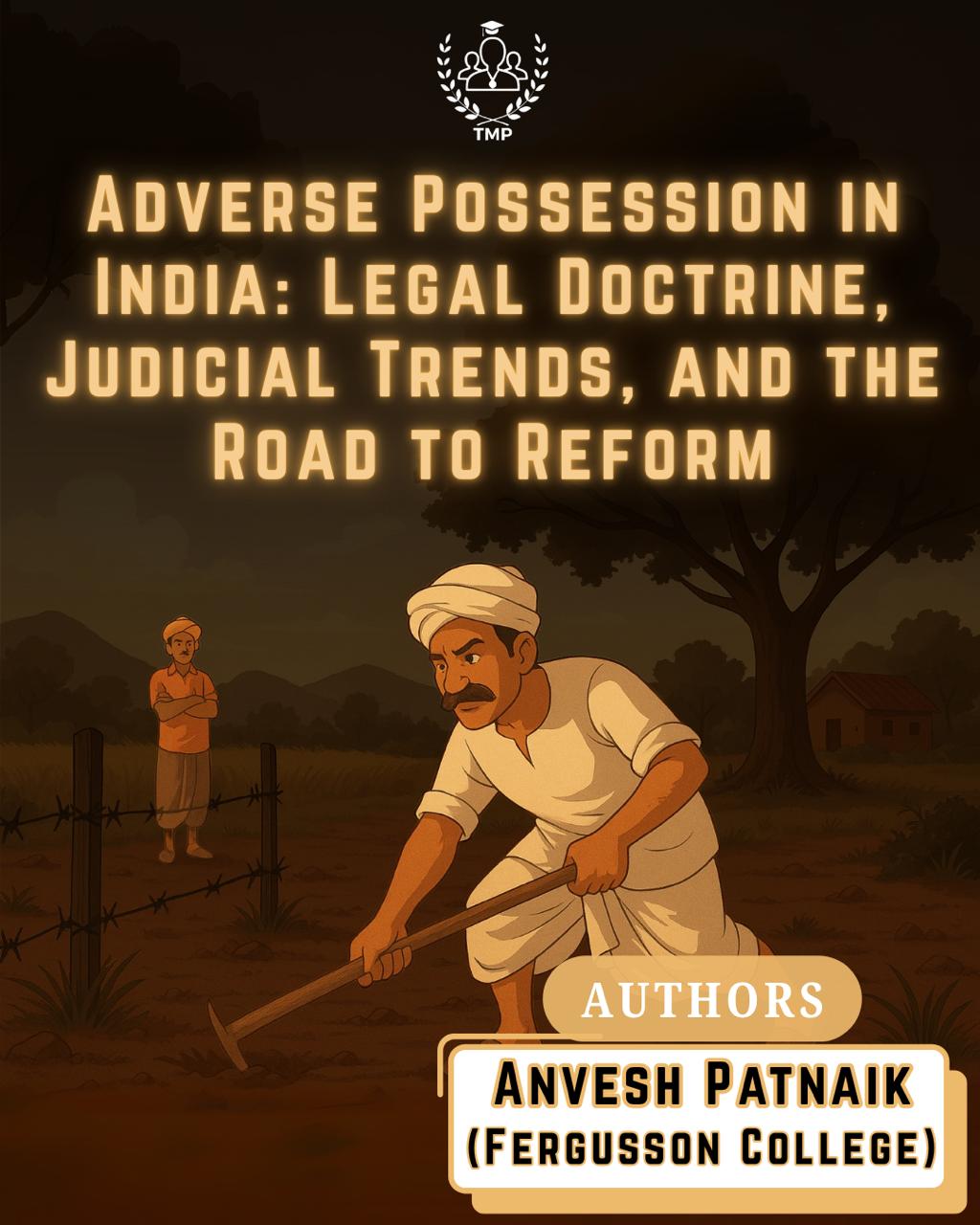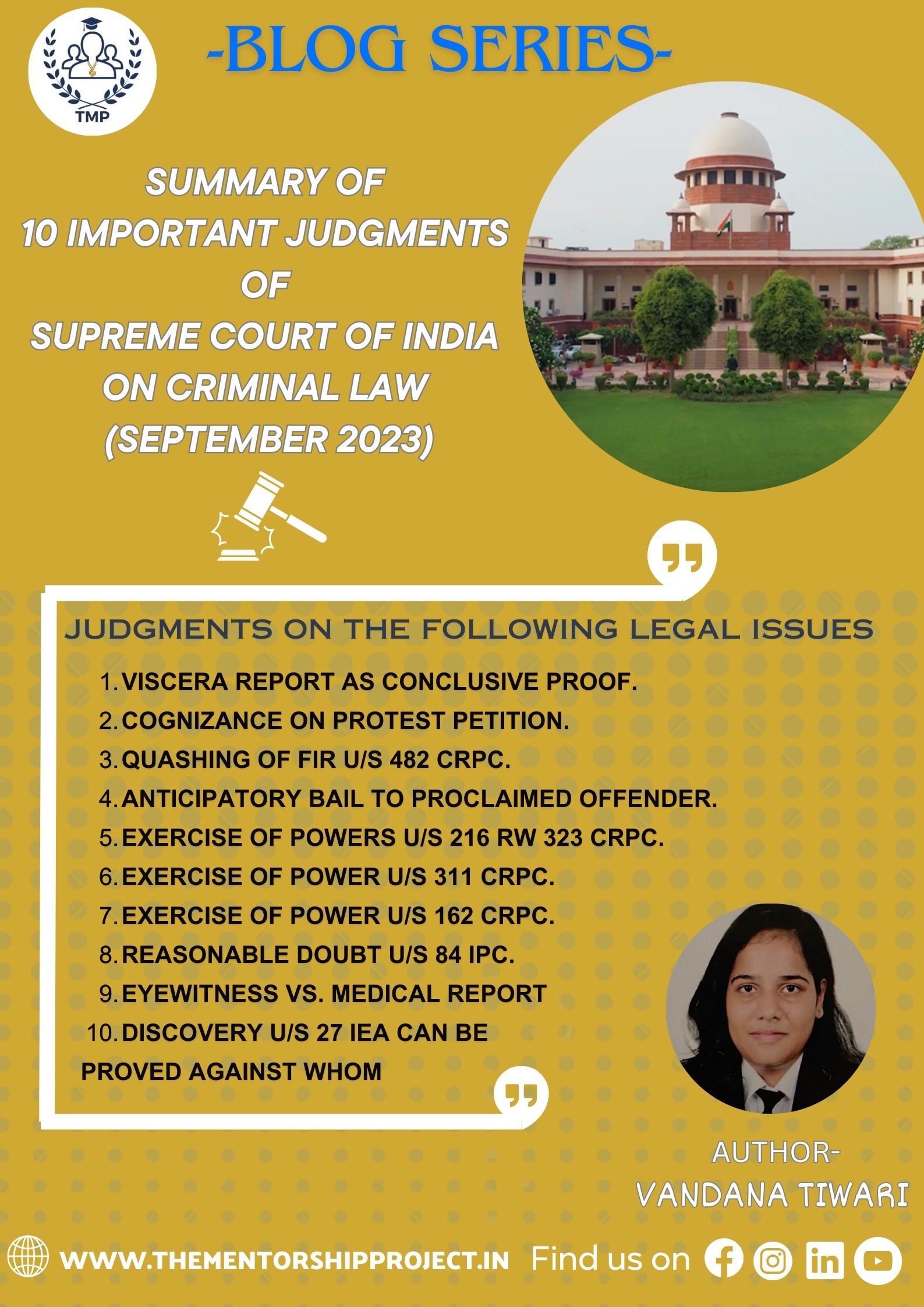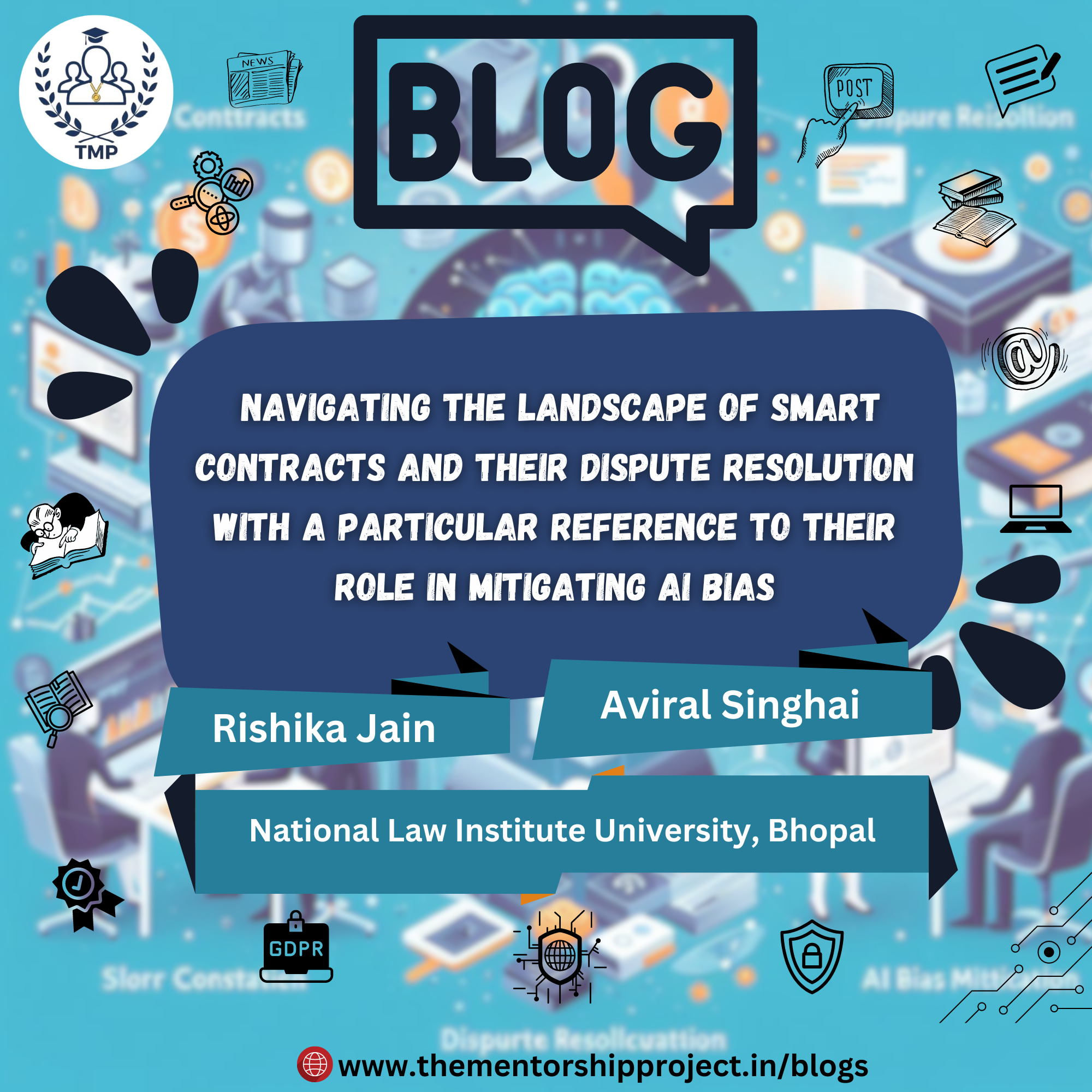October 03 , 2025
DOCTRINE OF ADVERSE POSSESSION IN INDIA
Conceptual Foundation of Adverse Possession
A legal doctrine known as "adverse possession" permits someone who is not the property's genuine owner to get title to it by means of hostile, continuous, and unbroken possession for a predetermined amount of time. According to the fundamental idea, land should not be left idle or dormant, and property owners who don't exercise their rights within a reasonable amount of time should give up their claims in favor of those who use the land regularly.
The theory is based on the idea that property rights need to be actively defended and protected; merely having ownership on paper is not enough. when someone openly and consistently occupies someone else's property for the allotted amount of time while the rightful owner is not there, the law presumes abandonment and transfers ownership to the adverse possessor.
- Legal Framework Under Indian Law
- Limitation Act, 1963
The doctrine of adverse possession in India is mainly governed by the Limitation Act, 1963. The relevant provisions include:
Article 65 of the Limitation Act prescribes a 12-year limitation period for suits seeking possession of immovable property based on title. The limitation period starts with when "the possession of the defendant becomes adverse to the plaintiff".
Article 64 governs suits for possession based on previous possession rather than title, also with a 12-year limitation period.
Article 112 extends the limitation period to 30 years for government property.
Section 27 of the Limitation Act provides that after the expiration of the prescribed period, the right to recover possession is extinguished.
A turning point in the Supreme Court's view of adverse possession was reached in the State of Haryana v. Mukesh Kumar case, where the Court voiced hitherto unheard-of criticism of the theory. Strong judicial condemnation resulted from the state government's attempt to use adverse possession to claim ownership of private property. The Supreme Court made several significant observations that reflect growing judicial discomfort with the doctrine. The Court observed that adverse possession allows the government to "grab the land/property of the defendants under the garb" of legal process, describing this as unfortunate in a democratic society.
The judgment emphasized that "the right to property is now considered to be not only a constitutional or statutory right, but also a human right", elevating property rights beyond mere legal technicalities.
The Court expressed surprise at the state's attempt to claim adverse possession, noting that "the State being a welfare State, cannot be permitted to take the plea of adverse possession, which allows a trespasser i.e. a person guilty of a tort, or even a crime, to gain legal title".
The judgment contained explicit recommendations for legislative intervention:
"We recommend the Union of India to immediately consider and seriously deliberate either abolition of the law of adverse possession and in the alternate to make suitable amendments in the law of adverse possession".
The Court specifically suggested that "Parliament must seriously consider at least to abolish 'bad faith' adverse possession, i.e., adverse possession achieved through intentional trespassing".
This landmark three-judge bench decision answered the question of whether plaintiffs might employ adverse possession offensively or merely defensively. The case arose from differing interpretations of whether a person claiming title through adverse possession might file a suit under Article 65 of the Limitation Act seeking a declaration of title and a permanent injunction.
The Court decisively held that adverse possession can be used both as a "sword" (by plaintiffs seeking declaration) and as a "shield" (by defendants resisting claims). The judgment overruled earlier decisions that had restricted adverse possession to defensive use only.
The Supreme Court addressed two principal issues in this judgment. First, regarding adverse possession under Article 65 of the Limitation Act, 1963, it was clarified that the term “title” includes rights acquired through adverse possession, and thus a suit for recovery of possession based on such title can only be maintained within 12 years from when adverse possession commences. Once this limitation expires, the original owner’s right is extinguished and the possessor gains prescriptive rights, which cannot be reversed by subsequent events. This interpretation was affirmed in favor of the appellants as of August 07, 2019, though not revisited in the present appeal since the original plaintiff’s possession was determined to be by permission, not hostile. Second, in relation to the registration of a Memorandum of Settlement, the Court found that after confirming the factual findings on property titles and consensual possession, an honest and binding family arrangement should be upheld to ensure peace and harmony within the family, as previously recognized in Kale v. Deputy Director of Consolidation. The Supreme Court ruled that a Memorandum of Settlement, if prepared solely for recording or mutating a previously agreed family arrangement, does not require compulsory registration under Section 17 of the Indian Registration Act, 1908. Prior judgments that required compulsory registration for decrees and orders were deemed not directly applicable to such memoranda, reaffirming the legal standing of unregistered family settlement records when intended strictly as documentation of a concluded arrangement.
- Tactful Reformation of the Doctrine of Adverse Possession
- Law Commission Report No. 280 (2023):
The 22nd Law Commission of India, led by Justice Ritu Raj Awasthi, issued a decisive conclusion in May 2023: there is no justification for amending the doctrine of adverse possession. The Commission emphasized the doctrine’s value in serving the broader public interest, distancing it from being categorized simply as a relic of colonial times or a tool for state unilateralism. It underlined that the law promotes efficient land utilization, ensuring that land does not remain idle or unused for indefinite periods. Moreover, it highlighted that the doctrine provides the stability of legal certainty, conferring clear ownership after a prescribed statutory period and thus warding off endless litigation over property. Crucially, the Commission pointed out the presence of built-in safeguards – namely, the claimant’s heavy burden of proof and judicial scrutiny – intended to minimize the potential for false or frivolous claims.
- Recommended Reforms:
A forward-looking reformation agenda – derived from jurisprudence, comparative study, and critical legal knowledge – would introduce several key changes. First, it would abolish the recognition of "bad faith" adverse possession claims, eliminating benefits for willful trespassers, while retaining protections for claimants with a genuine, good-faith belief in their ownership (such as in cases of honest inheritance or boundary confusion). Second, the statutory limitation period for private property could be extended to 25-30 years, while retaining the current 30-year period for government land, ensuring that only long-term, substantial connections to the property can result in a successful adverse possession claim. Some procedural safeguards would be enhanced which would say that claimants would have to notify registered owners of their intentions, offer compensation at market rates for the property, and substantiate their claim with strong documentary evidence, not just oral testimony. These changes would transform the doctrine from one perceived as confiscatory to one that is compensatory and fairer to all parties.
Additionally, if the claimant is acting in "good faith," by the showcase of yield from farming, rent from subleasing property, or any other appropriate course of business but exceeds the 12-year period of possession will also be taken into consideration for some form of relief during the claimant's period of possession. In the event that if any capital is invested, the claimant will be granted additional time to wrap any business and minimize any operational or financial burden upon him if he was evicted from the property as in due course.
In the country of United Kingdom due to their Land Registration Act, 2002, A person must occupy land for at least 10 years before applying to be registered as owner. Therefore, a Land Registry must notify the registered owner, who then has a statutory window of 65 business days to object. If the owner objects within the period, the claim is denied unless very limited exceptions apply, i.e. cases of mistaken boundary or estoppel. Only if the owner takes no action for two more years after notification does the adverse possessor's application succeed.
As a result, India will also create a type of land registry authority that will survey properties for encroachment or boundary-related errors caused by poor demarcation, and notify the registered landowner or title holder of any problems.
These reforms will provide the documented owner with substantial opportunity to contest adverse possession, drastically reducing risk of “lost” property due to lack of awareness. The focus has shifted to protecting formal, registered title, while still resolving longstanding neglect or genuine boundary disputes
Furthermore, constitutional protections must be foregrounded, ensuring compliance with principles of due process and upholding property rights. Full-bodied judicial review should be maintained to guard against abuse but also to accommodate legitimate claims genuinely fitting the spirit of the doctrine.
- Conclusion and Future Direction
India’s doctrine of adverse possession sits at a pivotal juncture, facing broad criticisms on both conceptual and practical grounds. While it undoubtedly served functional purposes in the past, current realities – both social and legal – render the status quo increasingly indefensible. The weight of judicial opinion, constitutional development, and scholarly critique call for sensible, well-crafted reform, rather than abrupt abolition or unchanged retention. A reformed doctrine could continue to uphold legal certainty and productive land use, but within a framework that truly respects property rights, procedural justice, and social equity. Reforming adverse possession along these lines would help restore confidence in the law as an instrument of genuine justice and prevent it from being a vehicle for arbitrary or discriminatory enrichment. It is now called upon to answer the Supreme Court’s persistent call for modernization and create a doctrine that truly reflects India's contemporary values and constitutional commitments.









